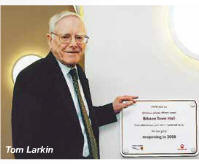
On 1st April 1966, the Local Government Bill that took away Bilston’s proud independence came into force. Local Historian, Tom Larkin, looks back at the efforts by the people of the town, to try and stop this happening. In 1959 the government revealed it was contemplating changes to existing local boundaries, but few people paid any attention, then as more detailed information emerged it became clear that they involved the complete destruction of nineteen historic councils and their replacement by enlarged units of local government achieved by forced amalgamation.
Early in 1960 the powerful Association of Municipal Authorities after hours scrutinising the recommended new boundary lines agreed to a motion stating “that urgent steps be taken to ensure those small local councils retain their long established independence”. The response from residents living in locations such as Darlaston, Tipton, and Wednesbury, along with other similar towns facing extinction was very predictable they made it clear that it was their wish for things to remain the same. This only confirmed the fact that Black Country communities have always been fiercely proud of their traditions, culture, heritage and character.Consequently, a decision was taken to oppose the plan and utilise every democratic option available to persuade the government they should reconsider the most controversial aspects of their widespread proposals.
The first stirrings of this grassroots revolt occurred in the borough of Bilston on 13th June 1961 with the forming of a citizen’s defence committee.The inaugural meeting was convened through the distribution a small card inviting people to come along and support positive action against the proposals of the boundary commission for the death of Bilston”
The chairman and three founding members were all well known local business men or dignitaries. They consisted of Dr R Abbott, local doctor, Walter Hughes a justice of the peace, F Collins Funeral director, and G Stead, local business man. It adopted the slogan “Bilston for Bilstonians” and launched what was to become the famous “Fighting fund”. In addition, various controversial posters were printed, urging people to join in the forthcoming struggle. At that time the town population was around 34,000 and a decision was made to organise a mass petition. This successfully attracted just over 19,000 signatures and Bilston became front runners in efforts to widen the campaign by attempting to persuade equally threatened neighbouring authorities to establish a united strategy of opposition. From the beginning volunteers who came forward to offer their help realised that one of the vital priorities would be that of raising money to sustain the struggle so they set out a programme of regular whist drives, coffee mornings, jumble sales, raffles, street and pub collections, dances, concerts in addition a policy of frequent leaflet distribution and lobbying MPs.
All of these activities were backed up in an unusual way with the novelty of a replica coffin being paraded through the town asking people to throw in their loose change, it would also be placed in various shops, displaying the message “that Bilston’s entire future an independent council was at stake". Another unique feature of Bilston’s protest movement came with the one off gesture of five representatives from both of the town’s main political parties meeting in order to agree on a truce giving them the opportunity of openly supporting the cause. Needless to say their actions angered each of their London headquarters’ but it made no difference they still stuck to the agreement.Another development that was exceptional was that of local fish shops enclosing inside customer’s orders a leaflet with the warning “if Wolverhampton take over, Bilston will have had its chips”.